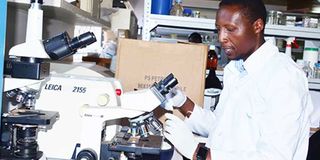Who is afraid of GMOs? Fear peddlers

Dr Steven Runo, Principal Investigator of Striga Weed Control Project at the Plant Transformation Laboratory, Kenyatta University. PHOTO | COURTESY
What you need to know:
Labour has reduced substantially, making farming smarter and attractive to the youth.
By 2016, 185.1 million hectares of biotech crops were grown.
Opinion on the actual benefits of biotech crops is sharply divided, even as experts and farmer testimonials affirm the facts.
The genetically modified organism (GMO) debate remains engulfed in a maelstrom of controversies. Sadly, what is largely a First-World debate continues to increasingly hurt poor farmers in the developing world.
While sharing knowledge about developments in modern biotechnology and biosafety around the globe, I have had an opportunity to interact with all cadres of society. What still baffles me is the amount of fear perpetuated about genetic modification in agriculture.
This is despite biotech crops having been in the market and in our food chain for more than two decades. By 2016, for example, 185.1 million hectares of biotech crops — more than the total arable land of China or the United States — were grown.
Opinion on the actual benefits of biotech crops is sharply divided, even as experts and farmer testimonials affirm the facts. So, recently, I posed and asked myself, who exactly is afraid of GMOs, and why?
FOOD SUPPLY
The top four reasons I came across were: Fear of multinationals’ control of our food supply; farmer exploitation; trade-related concerns; and long-term effects. An examination of those behind the fear revealed interesting realities.
Control by multinationals is a juicy scare story by groups mainly from the West, where all forms of technology abound and consumers are spoilt for choice. I once ordered a glass of water in Europe and was amused by the questions I had to answer before quenching my thirst — “still”, “fizzy”, “flavoured”, “honest”, “hot”, “ice-cold”.... My take home from that experience was that innovations open a range of choices but never a replacement for I still quenched my thirst in the manner that I prefer.
In Africa, public sector interest in GMO research has increased in the past decade with exciting results in agriculture — such as advanced genetically modified research on important food security crops such as banana, cassava and cowpea.
Since the fear is not about the technology per se, why can’t those afraid of multinationals redirect the millions of dollars spent scare-mongering to aid public sector research?
BIOTECH CROPS
More than 18 million farmers grow biotech crops. Their harvests have been protected from some of the most destructive pests while savings increased.
Labour has reduced substantially, making farming smarter and attractive to the youth. Yet huge resources are spent “educating farmers” about the “dangers” of GMOs.
Some groups argue that farmers will be rendered dependent on seed companies and unable to replant their seeds. This notion presupposes that farmers have no mind of their own or are incapable of making rational choices about their farm enterprises.
Therefore, when a country like Burkina Faso in West Africa experienced a challenge with the Bt cotton varieties that farmers had grown successfully (and profitably over eight years), many “international experts” landed to document the “technology failure”.
Paradoxically, the problem in Burkina Faso has nothing to do with the technology but the breeding programme. Indeed, Burkinabe farmers have been calling on their government and cotton companies to fix the issue so that they can go back to profitable Bt cotton farming. Preliminary results indicate a 70 per cent increase in insecticide application since halting of Bt cotton in 2016. This is bad for farmers’ health and the environment.
BREEDING PROGRAMME
Again, those beating the loudest drums of condemnation, could you consider partnering with Burkina Faso’s breeding programme to fix the lint concern since it has nothing to do with the technology?
On trade, the commonly perpetuated fear is loss of the EU market since the perception out there is that Europeans do not like GMOs. From a historical perspective, this is important for Africa.
Threats to block exports if a country adopts the technology have been reported even where the crops in question have no biological relationship. No cross-breeding whatsoever would occur between cotton and French beans or flowers, for instance, yet fresh produce exporters are subjected to declarations of a GMO-free growing environment!
TRADE LOSS
Europe has approved more than 80 GM events and imports more than 30 million tonnes of GM soya bean annually, making the continent one of the largest regional importers of GMOs.
Most of these are sourced from the US, Brazil and Argentina, where GMO adoption is over 90 per cent.
According to Robert Paarlberg, 10 years ago (2008), at least 87 recombinant (genetically engineered) drugs had been approved in Europe. Who, then, is driving this fear in the pretext of trade loss?
Dr Karembu is director of International Service for the Acquisition of Agri-biotech Applications (ISAAA) AfriCenter and chair of the Open Forum on Agricultural Biotechnology (OFAB) - Kenya Chapter. [email protected]




